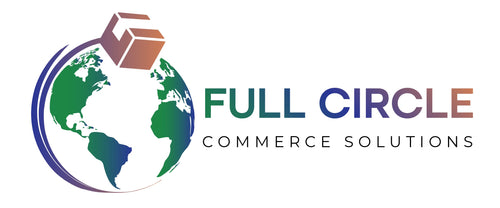FullCircle Commerce Solutions
Business Consulting
Business Consulting
Couldn't load pickup availability
Small Business Consulting
In the current economic environment, it is important that businesses find ways to stand out, tighten their operations, and increase their revenues while keeping expenses low. As many businesses struggle to stay ahead of the competition, the day-to-day operations of the business are more than enough to keep management busy, especially in smaller businesses where owners or managers wear many hats. Choosing FullCircle allows businesses the ability to grow, rather than simply attempting to maintain the status quo. Our 10 step process will optimize operations which translate into money saving solutions.
1. Providing information and data about FullCircle.
2. Compiling client’s problems through our proprietary process.
3. Making diagnosis of complied problems.
4. Making recommendations based on the diagnosis.
5. Assisting with implementation of recommended solutions.
6. Building a consensus and commitment around corrective action.
7. Facilitating client learning—that is, teaching clients how to resolve similar problems in the future.
8. Streamline Inventory flow using sales data.
9. Build out or Improve E-commerce platform
The lower-numbered processes are better understood/practiced and are also more requested by our clients. Our consultants, however, aspire to the higher stage on the process chart , where a more complex level of integration is required.
Purposes 1 through 5 are generally considered legitimate functions, though some controversy surrounds purpose 5. Higher level management consultants are brought in to address purposes 6 through 10 explicitly.
Moving up the process flow toward more ambitious purposes requires increasing sophistication and skill in the processes of consulting and in managing the consultant-client relationship.
1. Providing Information
FullCircle formulates a comprehensive analysis by gathering data from various fields going back to the fist day of business to current day.
What will you do with the information once you’ve got it? Many clients have never thought about that.” FullCircle's goal is to make better use of data already available.
Seemingly impertinent questions from both sides should not be cause for offense—they can be highly productive. Moreover, our professionals have a responsibility to explore the underlying cause of concern.
2. Solving Problems
Managers often give consultants difficult problems to solve. For example, a client might wish to know whether to make or buy a component, acquire or divest a line of business, or change a marketing strategy. Or management may ask how to restructure the organization to be able to adapt more readily to change; which financial policies to adopt; or what the most practical solution is for a problem in compensation, morale, efficiency, internal communication, control, management succession, or whatever.
Seeking solutions to problems of this sort is certainly a legitimate function. FullCircle also has a professional responsibility to ask whether the problem as posed is what most needs solving. Very often the client needs help most in defining the real issue; indeed, some authorities argue that executives who can accurately determine the roots of their troubles do not need management consultants at all. Thus the consultant’s first job is to explore the context of the problem. To do so, he or she might ask:
- Which solutions have been attempted in the past, with what results?
- What untried steps toward a solution does the client have in mind?
-
Which related aspects of the client’s business are not going well ?
Our client managers understand a need to explore a problem before setting out to solve it and realize that the definition of the most important problem may well shift as the study proceeds.
3. Effective Diagnosis
The process by which an accurate diagnosis is formed sometimes strains the consultant-client relationship, since managers are often fearful of uncovering difficult situations for which they might be blamed. Competent diagnosis requires more than an examination of the external environment, the technology and economics of the business, and the behavior of nonmanagerial members of the organization. our consultants will ask why executives made certain choices that now appear to be mistakes or ignored certain factors that now seem important.
4. Recommending Actions
The engagement characteristically concludes with a written report or oral presentation that summarizes what FullCircle has learned and recommends in detail what the client should do. Our consultant recommends, and the client decides whether and how to implement. Though it may sound like a sensible division of labor, this setup is in many ways simplistic.
5. Implementing Changes
Since recommendations that are not implemented (or are implemented badly) are a waste of money and time. And just as the client may participate in diagnosis without diminishing the value of the consultant’s role, so there are many ways in which the consultant may assist in implementation without usurping the manager’s job.
A consultant will often ask for a second engagement to help install a recommended new system. The collaborative process is implemented to avoid shock of such a sudden shift in process. Effective work on implementation problems requires a level of trust and cooperation that is developed gradually throughout the engagement. Recommendations may be confined to those steps our consultant believes will be implemented well.
6. Building Consensus & Commitment
In addition to increasing commitment through client involvement during each phase, the consultant may kindle enthusiasm with the help of an ally from the organization (not necessarily the person most responsible for the engagement). Whatever the ally’s place in the organization, he or she must understand the consultant’s purposes and problems. Such a sponsor can be invaluable in providing insight about the company’s functioning, new sources of information, or possible trouble spots. The role is similar to that of informant-collaborator in field research in cultural anthropology, and it is often most successful when not explicitly sought.
7. Facilitating Client Learning
Our management consultants will leave behind a digital infrastructure of lasting value. This means not only enhancing clients’ ability to deal with immediate issues but also helping them learn methods needed to cope with future challenges. Our consultants facilitate learning by including members of the organization in the assignment’s processes. For example, demonstrating an appropriate technique or recommending a relevant book often accomplishes more than quietly performing a needed analysis. When the task requires a method outside the professional’s area of expertise, he or she may recommend educational programs. However, some members of management may need to acquire complex skills that they can learn only through guided experience over time.
8. Streamline Inventory flow using sales data
Products and Flow patterns vary , FullCircle analyzes client needs and optimizes flow cycles customized to individual sectors of operations.
9.Build/Improve E-Commerce Platform
The digital marketspace has experienced continuous triple digit growth, our focus at FullCircle is to help our clients capture E-commerce market share within their respective field. Our international web development team works around the clock to insure set goals are reached within a cost effective & timely manner.
10. Organizational Effectiveness
Sometimes successful implementation requires not only new management concepts and techniques but also different attitudes regarding management functions and prerogatives or even changes in how the basic purpose of the organization is defined and carried out. The term organizational effectiveness is used to imply the ability to adapt future strategy and behavior to environmental change and to optimize the contribution of the organization’s human resources.
Our consultants are not crusaders bent on reforming management styles and assumptions. But professional who diagnose should overall organizational effectiveness. Good advisers are practitioners, not preachers, but their practices are consistent with their beliefs.
Overall Benefits
FullCircle provides a significant amount of value for an organization. Helping to develop strategies for growth or manage projects. Since our consultants are not committed to a single firm, they bring experience from a variety of companies and industries, which allows them to offer creative solutions and enables “out of the box” thinking. They can provide an objective viewpoint, which allows for more diverse ideas than could be provided solely by employees within the organization. Our consultants have a higher level of business expertise than the average employee and can provide unique solutions for businesses. Companies may want to consider the advantages of the level of expertise that can be brought by a consultant, as well as how they could benefit from having an established strategic plan.
COSTS
In the U.S., small business consulting fees range from $500 to $25,000, with an average cost of $2,500. The hourly cost of consulting fees range from about $45 to $150 per hour. Keep in mind that the fees you'll pay can vary depending on the field.
FullCircle has the most completive consulting price structure in the United States with a 30 Minute Video consult starting at $99


